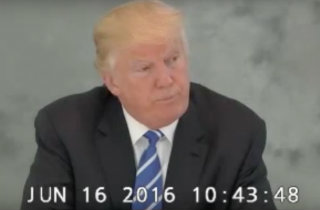
The deposition was in connection to a chef pulling out of a restaurant deal at Trump’s new hotel in Washington D.C. Upon Trump’s insistence, the deposition apparently took place at Trump Tower after the President-elect made the request citing “security reasons” in addition to cost and convenience.
The deposition involves a lawsuit filed against Chef Jose Andres. Both Andres, and fellow restaurateur Geoffrey Zakarian pulled out of the deal shortly after Trump made some controversial remarks about Mexican immigrants — calling them “rapists.”
Trump wanted to cap the deposition to just two hours or cancel it entirely, but DC Superior Court Judge Jennifer A. Di Toro ruled that Trump must sit for the session — and it could last up to 7 hours. Alan Garten, Executive Vice President and General Counsel, The Trump Organization released the following statement to LawNewz.com regarding what happened this morning:
“The deposition was completed earlier today and lasted just over one hour as the case is fairly straightforward. In short, the parties entered into a valid and enforceable lease, which the tenant clearly breached by walking out and failing to perform its obligations, thereby entitling the landlord to recover damages in the form of unpaid rent, cost of build out, lost profits and other expenses.”
Andres has apparently tried to bring this lawsuit to an end and strike some kind of deal with Trump. On Thursday morning, Andres tweeted this:
It seems though that, at this point, Trump is unwilling to settle. The President-elect did sit for a deposition in June as a part of a separate lawsuit against Zakarian, who also pulled out of a deal to open a restaurant. (WATCH BELOW)
This isn’t the only lawsuit that Trump may face as president. He could end up getting caught up in as many as 75 others. In November, Trump agreed to a $25 million settlement over the outstanding fraud lawsuits over his Trump University real estate courses.
In case you were wondering, Trump would not be the first President to sit for a deposition. President Bill Clinton was deposed as part of a lawsuit filed by Paula Jones who accused him of sexual harassment. At the time, Clinton argued that he couldn’t be sued because he was a sitting president. The case went all the way up to the Supreme Court. SCOTUS ruled that presidents can indeed be sued for actions that take place prior to taking office or that are not related to the Presidency. As we previously reported, Justice John Paul Stevens wrote in his 1997 opinion that while Presidents may be protected from liability regarding official actions in office so they can “perform their designated functions effectively without fear,” that protection does not extend to unofficial conduct.
Editor’s note: This article has been updated to include a statement from Trump’s attorney.
[image via 2016 deposition]